Posted by: site admin @ 7:01 am
𝓛𝓔𝓢𝓢𝓞𝓝 4115 Fri 8 Oct 2021
Mindful
Swimmer Lavender Awakened CMJC from Dolphin Aquatics Halasuru
participates in State Masters Swimming competition in 75-79 years group
at Vijayanagar Aquatics on 9 & 10 October 2021. Wish all the
competitors Happy Swimming Success.
Wake up at 03:45 AM
After Bath Practice Patanjali Yogic Meditation From 04:00 AM to 05:00 AM at
𝙆𝙪𝙨𝙝𝙞𝙣𝙖𝙧𝙖 𝙉𝙄𝘽𝘽Ā𝙉𝘼 𝘽𝙃𝙐𝙈𝙄 𝙋𝙖𝙜𝙤𝙙𝙖
18𝙛𝙩 𝘿𝙞𝙖. 𝙖 3𝘿 360 𝙙𝙚𝙜𝙧𝙚𝙚 𝙘𝙞𝙧𝙘𝙪𝙡𝙖𝙧 𝙋𝙖𝙜𝙤𝙙𝙖 𝙖𝙩
𝙒𝙝𝙞𝙩𝙚 𝙃𝙤𝙢𝙚,
668 5𝙩𝙝 𝘼 𝙈𝙖𝙞𝙣 𝙍𝙤𝙖𝙙,
8𝙩𝙝 𝘾𝙧𝙤𝙨𝙨, 𝙃𝘼𝙇 𝙄𝙄𝙄 𝙎𝙩𝙖𝙜𝙚,
𝙋𝙪𝙣𝙞𝙮𝙖 𝘽𝙃𝙐𝙈𝙄 𝘽𝙚𝙣𝙜𝙖𝙡𝙪𝙧𝙪,
𝙈𝙖𝙜𝙖𝙙𝙝𝙞 𝙆𝙖𝙧𝙣𝙖𝙩𝙖𝙠𝙖,
𝙋𝙧𝙖𝙗𝙪𝙙𝙙𝙝𝙖 𝘽𝙝𝙖𝙧𝙖𝙩 𝙄𝙣𝙩𝙚𝙧𝙣𝙖𝙩𝙞𝙤𝙣𝙖𝙡

𝙗𝙪𝙙𝙙𝙝𝙖𝙨𝙖𝙞𝙙2𝙪𝙨@𝙜𝙢𝙖𝙞𝙡.𝙘𝙤𝙢
𝙟𝙘𝙨4𝙚𝙫𝙚𝙧@𝙤𝙪𝙩𝙡𝙤𝙤𝙠.𝙘𝙤𝙢
𝙟𝙘𝙝𝙖𝙣𝙙𝙧𝙖𝙨𝙚𝙠𝙝𝙖𝙧𝙖𝙣@𝙮𝙖𝙝𝙤𝙤.𝙘𝙤𝙢
080-25203792
9449260443
9449835875
Spread the Words of Buddha from
𝙝𝙩𝙩𝙥://𝙨𝙖𝙧𝙫𝙖𝙟𝙖𝙣.𝙖𝙢𝙗𝙚𝙙𝙠𝙖𝙧.𝙤𝙧𝙜, WhatApp, Telegram,Facebook, Twitter, more than 5000 Emails.
is the romanized Sanskrit version of the Heart-dhāraṇī of
Avalokiteśvara-ekadaśamukha a.k.a Eleven-Faced Avalokitesvara Heart
Dharani Sutra:
is generally believed that this dhāraṇī has no direct relationship with
the The Great Compassion Mantra in Mahayana Buddhism. However, it is
often falsely named as Tibetan Great Compassion Mantra (藏传大悲咒) or The
Great Compassion Mantra in Sanskrit (梵音大悲咒) in Chinese-speaking regions.
people believe that this dhāraṇī is told by the Eleven-Faced
Avalokitesvara, an esoteric bodhisattva in Tibetan Buddhism, and that it
is the equivalent Tibetan version of The Great Compassion Mantra in
Mahayana Buddhism. This is why it is often being referred to as Tibetan
Great Compassion Mantra. However, this opinion is not accepted by most
Mahayana Buddhists.
Corporation (Music); LatinAutorPerf, Abramus Digital, LatinAutor,
LatinAutor - PeerMusic, ASCAP, and 11 Music Rights Societies
the Buddha explains what is singing and dancing in the discipline of
the noble ones, and then gives his instrunction regarding laughing and
smiling.
bhikkhave, ariyassa vinaye yadidaṃ gītaṃ. Ummattakam-idaṃ, bhikkhave,
ariyassa vinaye yadidaṃ naccaṃ. Komārakam-idaṃ, bhikkhave, ariyassa
vinaye yadidaṃ ativelaṃ danta-vidaṃsaka-hasitaṃ. Tasmātiha, bhikkhave,
setughāto gīte, setughāto nacce, alaṃ vo dhamma-ppamoditānaṃ sataṃ sitaṃ
sita-mattāyā.
is lamentating, bhikkhus, in the discipline of the noble ones, to sing.
It is being out of one’s mind, bhikkhus, in the discipline of the noble
ones, to dance. It is childish, bhikkhus, in the discipline of the
noble ones to laugh excessively showing the teeth. Therefore, bhikkhus,
having given up{1} singing, having given up dancing, it is suitable for
you who delight in the Dhamma to smile moderately mindful smiles.
On one occasion the Blessed One was staying at Savatthi, in Jeta’s
Grove, Anathapindika’s monastery. There he addressed the monks:
N·āhaṃ, bhikkhave, aññaṃ eka·rūpam·pi samanupassāmi yaṃ evaṃ purisassa
cittaṃ pariyādāya tiṭṭhati yatha·y·idaṃ, bhikkhave, itthi·rūpam.
Itthi·rūpam, bhikkhave, purisassa cittaṃ pariyādāya tiṭṭhatī ti.
I do not know, bhikkhus, of a form that overpowers the mind of a man as
much as, bhikkhus, the form of a woman. The form of a woman, bhikkhus,
overpowers the mind of a man.
N·āhaṃ, bhikkhave, aññaṃ eka·saddam·pi samanupassāmi yaṃ evaṃ purisassa
cittaṃ pariyādāya tiṭṭhati yatha·y·idaṃ, bhikkhave, itthi·saddo.
Itthi·saddo, bhikkhave, purisassa cittaṃ pariyādāya tiṭṭhatī ti.
I do not know, bhikkhus, of a sound that overpowers the mind of a man
as much as, bhikkhus, the sound of a woman. The sound of a woman,
bhikkhus, overpowers the mind of a man.
N·āhaṃ, bhikkhave, aññaṃ eka·gandham·pi samanupassāmi yaṃ evaṃ
purisassa cittaṃ pariyādāya tiṭṭhati yatha·y·idaṃ, bhikkhave,
itthi·gandho. Itthi·gandho, bhikkhave, purisassa cittaṃ pariyādāya
tiṭṭhatī ti.
I do not know, bhikkhus, of an odor that overpowers the mind of a man
as much as, bhikkhus, the odor of a woman. The odor of a woman,
bhikkhus, overpowers the mind of a man.
N·āhaṃ, bhikkhave, aññaṃ eka·rasam·pi samanupassāmi yaṃ evaṃ purisassa
cittaṃ pariyādāya tiṭṭhati yatha·y·idaṃ, bhikkhave, itthi·raso.
Itthi·raso, bhikkhave, purisassa cittaṃ pariyādāya tiṭṭhatī ti.
I do not know, bhikkhus, of a taste that overpowers the mind of a man
as much as, bhikkhus, the taste of a woman. The taste of a woman,
bhikkhus, overpowers the mind of a man.
N·āhaṃ, bhikkhave, aññaṃ eka·phoṭṭhabbam·pi samanupassāmi yaṃ evaṃ
purisassa cittaṃ pariyādāya tiṭṭhati yatha·y·idaṃ, bhikkhave,
itthi·phoṭṭhabbo. Itthi·phoṭṭhabbo, bhikkhave, purisassa cittaṃ
pariyādāya tiṭṭhatī ti.
I do not know, bhikkhus, of a touch that overpowers the mind of a man
as much as, bhikkhus, the touch of a woman. The touch of a woman,
bhikkhus, overpowers the mind of a man.
N·āhaṃ, bhikkhave, aññaṃ eka·rūpam·pi samanupassāmi yaṃ evaṃ itthiyā
cittaṃ pariyādāya tiṭṭhati yatha·y·idaṃ, bhikkhave, purisa·rūpam.
Purisa·rūpam, bhikkhave, itthiyā cittaṃ pariyādāya tiṭṭhatī ti.
I do not know, bhikkhus, of a form that overpowers the mind of a woman
as much as, bhikkhus, the form of a man. The form of a man, bhikkhus,
overpowers the mind of a woman.
N·āhaṃ, bhikkhave, aññaṃ eka·saddam·pi samanupassāmi yaṃ evaṃ itthiyā
cittaṃ pariyādāya tiṭṭhati yatha·y·idaṃ, bhikkhave, purisa·saddo.
Purisa·saddo, bhikkhave, itthiyā cittaṃ pariyādāya tiṭṭhatī ti.
I do not know, bhikkhus, of a sound that overpowers the mind of a woman
as much as, bhikkhus, the sound of a man. The sound of a man, bhikkhus,
overpowers the mind of a woman.
N·āhaṃ, bhikkhave, aññaṃ eka·gandham·pi samanupassāmi yaṃ evaṃ itthiyā
cittaṃ pariyādāya tiṭṭhati yatha·y·idaṃ, bhikkhave, purisa·gandho.
Purisa·gandho, bhikkhave, itthiyā cittaṃ pariyādāya tiṭṭhatī ti.
I do not know, bhikkhus, of an odor that overpowers the mind of a woman
as much as, bhikkhus, the odor of a man. The odor of a man, bhikkhus,
overpowers the mind of a woman.
N·āhaṃ, bhikkhave, aññaṃ eka·rasam·pi samanupassāmi yaṃ evaṃ itthiyā
cittaṃ pariyādāya tiṭṭhati yatha·y·idaṃ, bhikkhave, purisa·raso.
Purisa·raso, bhikkhave, itthiyā cittaṃ pariyādāya tiṭṭhatī ti.
I do not know, bhikkhus, of a taste that overpowers the mind of a woman
as much as, bhikkhus, the taste of a man. The taste of a man, bhikkhus,
overpowers the mind of a woman.
N·āhaṃ, bhikkhave, aññaṃ eka·phoṭṭhabbam·pi samanupassāmi yaṃ evaṃ
itthiyā cittaṃ pariyādāya tiṭṭhati yatha·y·idaṃ, bhikkhave,
purisa·phoṭṭhabbo. Purisa·phoṭṭhabbo, bhikkhave, itthiyā cittaṃ
pariyādāya tiṭṭhatī ti.
I do not know, bhikkhus, of a touch that overpowers the mind of a woman
as much as, bhikkhus, the touch of a man. The touch of a man, bhikkhus,
overpowers the mind of a woman.
Buddha explains for us once more, in yet another way, the cause and the
cessation of suffering. It takes place right in the middle of what we
keep doing all day and all night.
bhikkhave, deva·manussā rūpa·ratā rūpa·sammuditā.
rūpa·vipariṇāma·virāga·nirodhā dukkhā, bhikkhave, deva·manussā
viharanti.
and humans, bhikkhus, take pleasure in (visible) forms, delight in
forms, rejoice on account of forms. With the alteration, dissolution and
cessation of forms, bhikkhus, devas and humans dwell in suffering.
bhikkhave, deva·manussā sadda·ratā sadda·sammuditā.
sadda·vipariṇāma·virāga·nirodhā dukkhā, bhikkhave, deva·manussā
viharanti.
and humans, bhikkhus, take pleasure in sounds, delight in forms,
rejoice on account of forms. With the alteration, dissolution and
cessation of forms, bhikkhus, devas and humans dwell in suffering.
bhikkhave, deva·manussā gandha·ratā gandha·sammuditā.
gandha·vipariṇāma·virāga·nirodhā dukkhā, bhikkhave, deva·manussā
viharanti.
and humans, bhikkhus, take pleasure in odors, delight in odors, rejoice
on account of odors. With the alteration, dissolution and cessation of
odors, bhikkhus, devas and humans dwell in suffering.
bhikkhave, deva·manussā rasa·ratā rasa·sammuditā.
rasa·vipariṇāma·virāga·nirodhā dukkhā, bhikkhave, deva·manussā
viharanti.
and humans, bhikkhus, take pleasure in tastes, delight in tastes,
rejoice on account of tastes. With the alteration, dissolution and
cessation of tastes, bhikkhus, devas and humans dwell in suffering.
bhikkhave, deva·manussā phoṭṭhabba·ratā phoṭṭhabba·sammuditā.
phoṭṭhabba·vipariṇāma·virāga·nirodhā dukkhā, bhikkhave, deva·manussā
viharanti.
and humans, bhikkhus, take pleasure in bodily phenomena, delight in
bodily phenomena, rejoice on account of bodily phenomena. With the
alteration, dissolution and cessation of bodily phenomena, bhikkhus,
devas and humans dwell in suffering.
bhikkhave, deva·manussā dhamma·ratā dhamma·sammuditā.
dhamma·vipariṇāma·virāga·nirodhā dukkhā, bhikkhave, deva·manussā
viharanti.
and humans, bhikkhus, take pleasure in mental phenomena, delight in
mental phenomena, rejoice on account of mental phenomena. With the
alteration, dissolution and cessation of mental phenomena, bhikkhus,
devas and humans dwell in suffering.
ca, bhikkhave, arahaṃ sammā·sambuddho rūpānaṃ samudayañ·ca
atthaṅgamañ·ca assādañ·ca ādīnavañ·ca nissaraṇañ·ca yathābhūtaṃ viditvā
na rūp·ārāmo na rūpa·rato na rūpa·sammudito.
rūpa·vipariṇāma·virāga·nirodhā sukho, bhikkhave, tathāgato viharati.
the Tathāgata, bhikkhus, the arahant, correctly and completely awaken,
having understood as they actually are the arising, the passing away,
the allure, the drawbacks and the emancipation from (visible) forms,
does not take pleasure in forms, nor delight in forms, nor rejoice on
account of forms. With the alteration, dissolution and cessation of
forms, bhikkhus, the Tathāgata dwells in well-being.
samudayañ·ca atthaṅgamañ·ca assādañ·ca ādīnavañ·ca nissaraṇañ·ca
yathābhūtaṃ viditvā na sadd·ārāmo na sadda·rato na sadda·sammudito.
sadda·vipariṇāma·virāga·nirodhā sukho, bhikkhave, tathāgato viharati.
understood as they actually are the arising, the passing away, the
allure, the drawbacks and the emancipation from sounds, he does not take
pleasure in sounds, nor delight in sounds, nor rejoice on account of
sounds. With the alteration, dissolution and cessation of sounds,
bhikkhus, the Tathāgata dwells in well-being.
samudayañ·ca atthaṅgamañ·ca assādañ·ca ādīnavañ·ca nissaraṇañ·ca
yathābhūtaṃ viditvā na gandh·ārāmo na gandha·rato na gandha·sammudito.
gandha·vipariṇāma·virāga·nirodhā sukho, bhikkhave, tathāgato viharati.
understood as they actually are the arising, the passing away, the
allure, the drawbacks and the emancipation from odors, he does not take
pleasure in odors, nor delight in odors, nor rejoice on account of
odors. With the alteration, dissolution and cessation of odors,
bhikkhus, the Tathāgata dwells in well-being.
samudayañ·ca atthaṅgamañ·ca assādañ·ca ādīnavañ·ca nissaraṇañ·ca
yathābhūtaṃ viditvā na ras·ārāmo na rasa·rato na rasa·sammudito.
rasa·vipariṇāma·virāga·nirodhā sukho, bhikkhave, tathāgato viharati.
understood as they actually are the arising, the passing away, the
allure, the drawbacks and the emancipation from tastes, he does not take
pleasure in tastes, nor delight in tastes, nor rejoice on account of
tastes. With the alteration, dissolution and cessation of tastes,
bhikkhus, the Tathāgata dwells in well-being.
samudayañ·ca atthaṅgamañ·ca assādañ·ca ādīnavañ·ca nissaraṇañ·ca
yathābhūtaṃ viditvā na phoṭṭhabb·ārāmo na phoṭṭhabba·rato na
phoṭṭhabba·sammudito. phoṭṭhabba·vipariṇāma·virāga·nirodhā sukho,
bhikkhave, tathāgato viharati.
understood as they actually are the arising, the passing away, the
allure, the drawbacks and the emancipation from bodily phenomena, he
does not take pleasure in bodily phenomena, nor delight in bodily
phenomena, nor rejoice on account of bodily phenomena. With the
alteration, dissolution and cessation of bodily phenomena, bhikkhus, the
Tathāgata dwells in well-being.
samudayañ·ca atthaṅgamañ·ca assādañ·ca ādīnavañ·ca nissaraṇañ·ca
yathābhūtaṃ viditvā na dhamm·ārāmo na dhamma·rato na dhamma·sammudito.
dhamma·vipariṇāma·virāga·nirodhā sukho, bhikkhave, tathāgato
viharatī·ti.
understood as they actually are the arising, the passing away, the
allure, the drawbacks and the emancipation from mental phenomena, he
does not take pleasure in mental phenomena, nor delight in mental
phenomena, nor rejoice on account of mental phenomena. With the
alteration, dissolution and cessation of mental phenomena, bhikkhus, the
Tathāgata dwells in well-being.
passion and delight supports the growth of consciousness attached to
form, feeling, perception and fabrication.http://myanmarsutta.net/
Mindful Swimmer Lavender Awakened CMJC from Dolphin Aquatics Halasuru
participates in State Masters Swimming competition in 75-79 years group
at Vijayanagar Aquatics on 9 & 10 October 2021. Wish all the
competitors Happy Swimming Success.
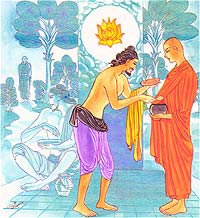
By giving up a modicum of pleasure, which the worldly pursuits bring,
if one can be assured of tremendous pleasure - which is Nibbana - the
wise person should give up the little pleasure.

The individual who achieves happiness by inflicting pain on others is
not freed from anger because he is entangled in the web of anger due to
the contact of the anger of other people.

If people do what should not be done, and neglect what should be done,
the blemishes of those proud, slothful ones begin to increase.
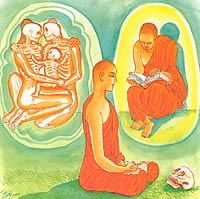
If one were to practice constantly on the mindfulness of physical
reality, maintaining steady attention on what has to be done, they will
shun what should not be done. The blemishes of those mindful, alert will
get eroded.

The brahmin kills the mother - craving, kills the father - egotism,
self-cherishing: They represent the two views, Eternalism and Nihilism,
opposed to Buddhist thought. The subordinates are clinging to life. And
he destroys the defilements which cling to life. Having destroyed all
these, the brahmin (arahat) goes without punishment.

The brahmin (arahat) kills the mother - craving; kills the father -
egotism; kills the two learned kings. They represent the two false views
eternalism and nihilism. He kills the five tigers (sensuality, hate,
mental inertia, worry and skeptical doubt) that obstruct the path. And,
having done all these killings, the arahat goes about unaffected.
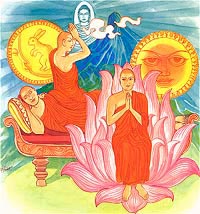
Those disciples of the Buddha who are mindful of the virtues of their
Teacher day and night, arise wide awake and in full control of their
faculties.

Those disciples of the Buddha who are mindful of the virtues of the
Dhamma day and night, arise wide awake and in full control of their
faculties.
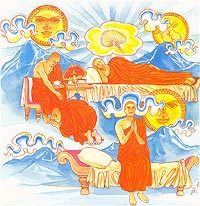
Those disciples of the Buddha who are mindful of the virtues of the
Sangha day and night, arise wide awake and in full control of their
faculties.

Those disciples of the Buddha who are mindful of the real nature of the
body day and night, arise wide awake and in full control of their
faculties.
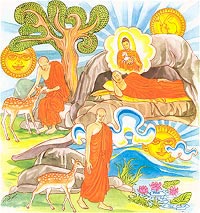
Those disciples of the Buddha who take delight in harmlessness day and
night, arise wide awake and in full control of their faculties.

Those disciples of the Buddha who take delight in meditation day and
night, arise wide awake and in full control of their faculties.

It is hard to become a monk; it is hard to be happy in the practice of a
monk. To live with those of a different temperament is painful. A
traveller in samsara is continually subject to dukkha; therefore, do not
be a traveller in samsara; do not be the one to be repeatedly subject
to dukkha.

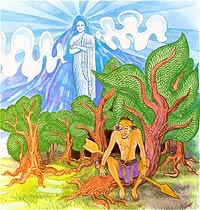
Like the Himalayas, the good are visible even from afar; like arrows
shot in the night, the wicked are not seen even though they may be near.
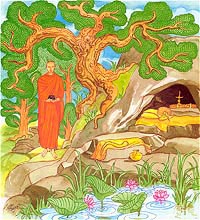
He who sits alone, lies down alone, walks alone, in diligent practice,
and alone tames himself, should find delight in living in the forest.


